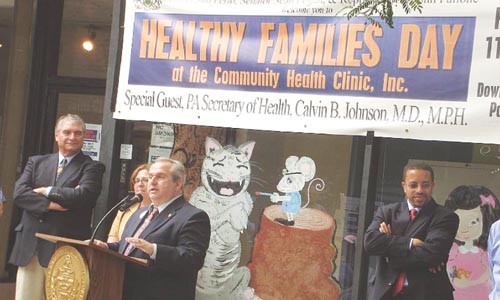A statewide effort at reducing troop levels in Iraq and Afghanistan officially kicks off at a press conference in Pittsburgh Aug. 9, coinciding with a national Democratic Party platform event taking place here.
State Sen. Jim Ferlo will hold a press conference at 4 p.m. Aug. 9 at the David L. Lawrence Convention Center during the national Democratic Party event, officially starting a grassroots effort to start getting the word out about the legislation.
"We're having the great benefit of the national Democratic committee platform meeting here on August 9th. We hope to encourage [delegates] in their consideration to [take the idea] back home," Ferlo says.
A bill will be introduced into the state Senate when it reconvenes for the fall which would attempt to halt Pennsylvania National Guard troops from being deployed overseas.
Pennsylvania has deployed more National Guard troops to the Middle East than any other state in the nation -- since 2001, more than 17,000 have been deployed, according to a report by Veterans for America, a DC-based advocacy group looking out for soldier welfare. Of the 19,000 National Guard troops in Pennsylvania, only about 1,000 are deployed currently, according to Lt. Col. Chris Cleaver, public affairs officer for the Pennsylvania National Guard. But 6,000 more troops are scheduled for deployment in February 2009 -- the largest deployment since the conflict began.
The measure would return control of the troops to Gov. Ed Rendell. Normally, control of Guard deployments belongs to governors and the president simultaneously -- and National Guard troops generally stay on U.S. soil, unless a dire threat to American citizens is identified. But a 2002 act of Congress, the Authorization of Military Force, gave President George W. Bush discretion to deploy troops in Iraq. That 2002 law is what proponents of the state bill hope to reverse.
"We need to take a state-by-state approach," says the bill's local sponsor, Lawrenceville Democrat Ferlo, because of the "lack of leadership on the part of Congress. This is yet another organizational tool -- Congress seems to have its ears closed." Noting that the 2002 resolution cited the presence of weapons of mass destruction and Al-Qaeda cells in Iraq, Ferlo says, "Even the original so-called legitimacy has been disproved."
Prospects for the measure seem uncertain at best. Cleaver stresses that the Guard takes no position on the proposed bill but says he "would characterize it as something that's unlikely." And in 1991, the U.S. Supreme Court shot down a similar effort by the governor of Minnesota, who sought to withhold Guard troops from his state from a federal mission in Central America. Rendell's office could not be reached for a response by deadline for this story, and Ferlo himself concedes "I'm not sure where the governor stands on this."
But antiwar activists aren't giving up. "We feel that the National Guard is not to be deployed to Iraq or Afghanistan," says Francine Porter, coordinator of CodePink Pittsburgh. "I think we have a really good shot at crafting legislation that will get past the House and the Senate."
The idea for the bill was originated by Philadelphia state Sen. Tony Payton. Local antiwar groups such as the Thomas Merton Center's Anti-War Committee and CodePink, a women's resistance group, are spreading the word, getting signatures on petitions and helping draft the bill. Other states, including Vermont, Maryland, Oregon and New Jersey have similar legislation pending.
"[New Orleans Hurricane] Katrina was a drastic example of what happens when the Guard is not available," Ferlo says. "There are any number of reasons why the Guard is needed -- flooding in Allegheny County, Millvale."
Cleaver says that "national leaders have looked to ensure that if there was some large-scale [domestic] disaster, there would be enough troops available." He also adds that federal funding relating to the war effort pays for millions of dollars of Pennsylvania's Guard equipment, an expense the state couldn't shoulder alone.
"When you look at the dynamics of calling up the National Guard for conflict, it shouldn't be an easy event to occur," Cleaver says. And it's not, he adds. "But it's also critically important that the guard be available to federal needs."
Of course, Pennsylvania's Guard makes up only a tiny fraction of the tens of thousands troops currently serving in Iraq. And if the bill were to succeed, it's possible troops would have to be assigned from somewhere else instead. But backers say every reduction in deployment is a victory.
"We want this war to end," says Ferlo. "It was built on a pretext of lies and falsehoods. Every other attempt to bring some rational discourse to Congress has been the epitome of failure. It's another opportunity to bring troops home."















